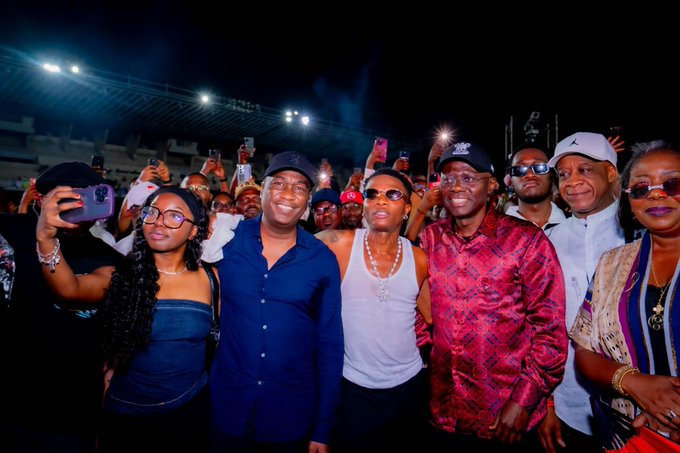Nigeria’s entertainment capital—became a global hotspot over the festive season, attracting partygoers, tourists, and revelers from across the world, and earning an astounding N4.32 billion ($2.7 million) through its nightclubs alone during the “Detty December” period.
According to a recent report by MO Africa Company Limited, this monumental financial success unfolded between November 19 and December 26, as the state’s nightlife and tourism sectors surged to unprecedented levels.
Nightlife, Tourism, and Economic Growth
Lagos saw a dramatic surge in both domestic and international tourism, drawing over 1.2 million visitors during the period. Surprisingly, 60% of these were Nigerians traveling within the country, fleeing the insecurity in the southeastern region that led many to choose the safer southwestern states. This influx of travelers contributed significantly to the thriving hospitality industry in Lagos, which has long been recognized as one of Africa’s top leisure destinations.
The nightclubs were particularly busy. According to Kayode Omosebi, the CEO of MO Africa Company Limited, the 15 top nightclubs in Lagos brought in an average of N360 million ($224,000) daily, raking in the N4.32 billion during the peak of the holiday season. Premium tables at the most sought-after venues saw nightly rentals rise to as much as N1.2 million ($746.7), a clear indication of the growing demand for exclusive experiences.
“It was a season of unparalleled celebration for Lagos nightlife,” said Omosebi. “We’re witnessing the city solidifying its reputation not just as a cultural hub, but as a world-class destination for high-end entertainment.”
Tourism and Its Contribution to Lagos’ Economic Boom
The report also revealed how Lagos and other southwestern states, including Edo, Delta, Ondo, and Ogun, saw huge numbers of visitors over the festive period. For many international tourists, Lagos emerged as a must-visit destination, offering everything from luxurious hotels to lively beach resorts and a vibrant cultural scene.
Hotels in the city experienced unprecedented success, with the total revenue for the month of December alone hitting N54 billion ($36 million) from over 15,000 bookings. Short-term apartment rentals also saw a surge, contributing an additional N21 billion ($13 million) to the economy. These short-let apartments, charging an average rate of N120,000 ($74.7) per night, were in high demand as visitors sought comfortable and flexible accommodation options.
“Over the course of December, we saw more bookings than we have in the past two years combined,” explained Tolu Alabi, a Lagos-based hotel manager. “It was a boom for the entire hospitality sector. Every aspect of tourism here flourished.”
The positive impact of this influx extended beyond hotels and nightclubs, as beaches and resorts reported a strong performance as well, generating 70% of the N4.5 billion ($2.8 million) earned from recreational activities. In total, Lagos saw over N80 billion ($52.7 million) generated from various leisure and hospitality sectors throughout the festive season.
The Cryptocurrency Factor: A Rising Trend
A noteworthy trend highlighted in the MO Africa report was the growing role of cryptocurrency in Lagos’ hospitality and tourism industries. Omosebi revealed that a staggering 85% of transactions were made through cryptocurrency platforms, signaling a shift in how Nigerians are conducting business, especially in the tourism and hospitality sectors.
“Many of our customers are opting to use cryptocurrency for transactions. It’s a preferred method for both domestic and international bookings,” Omosebi explained. “The convenience and security it provides are key reasons why it’s becoming the go-to option for many in this sector.”
The report also noted that many bookings were made through agents rather than online platforms, underscoring a trend where trust and relationships with local agents take precedence over automated services.
Event Centers and High-End Rentals Contribute to the Boom
The event sector, particularly in Lagos, played a significant role in the financial gains experienced during the holiday period. With 1,175 events taking place in December, ranging from concerts to corporate parties, event centers generated an impressive N1.2 billion ($804,000). In tandem, the luxury car rental market boomed, with Nigerians and foreigners alike spending N1.5 billion ($937,500) on 750 bookings for high-end vehicles. Ranging from N200,000 ($124.4) to N2 million ($1,244) per day, the demand for premium cars saw a significant uptick as affluent visitors sought luxury transportation options.
“We saw many high-profile clients, both domestic and international, rent luxury vehicles for the season,” said Victor Eke, a car rental service owner in Victoria Island. “The demand was overwhelming.”
A Bright Future for Lagos’ Hospitality Industry
Looking toward the future, Omosebi projected that the economic impact of “Detty December” would continue to grow. By 2026, he anticipates that the industry could generate as much as $2 billion in foreign exchange, further cementing Lagos’ status as a global entertainment and tourism center.
“The tourism and hospitality sector in Lagos is evolving rapidly. We’ll see more niche-focused experiences in the coming years, such as bespoke event centers and specialized concerts,” Omosebi noted. “The potential for growth is immense.”
In light of the positive results this year, both industry experts and the government have expressed optimism about the future of Lagos’ hospitality sector. As more tourists, both local and international, flock to the city for holiday seasons, the economic benefits could help propel Nigeria’s broader tourism industry to new heights.
For Lagos, “Detty December” has proven to be more than just a festive occasion; it’s an economic catalyst that is shaping the future of the city’s hospitality and tourism industries. As long as the trends continue, Lagos will remain at the forefront of Nigeria’s tourism and entertainment sectors.

